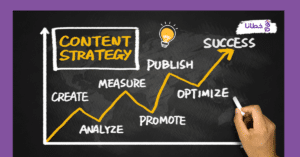table of contents
In our current era, the influence of social media and its role in digital marketing have become an integral part of our daily lives. They are powerful platforms for communication and interaction between individuals and businesses alike. In this article, we’ll explore how marketers can leverage these platforms to enhance their presence in the digital marketplace.
What is social media marketing?
Social Media Marketing (SMM) is the use of various social media platforms as marketing channels to achieve a company’s goals. This strategy includes a set of practices and activities and is characterized by the following features:
1- Reaching the target audience:
- Enables marketers to reach specific segments of users on social media platforms.
- Helps in communicating and interacting directly with current and potential customers.
2- Building brand and reputation:
- Helps in disseminating media and promotional content for the brand.
- It contributes to highlighting the company and enhancing its mental image.
3- Stimulating participation and interaction:
- Encourages users to share and interact with posts and content.
- Helps get direct feedback from customers.
4- Performance measurement and analysis:
- Social media platforms allow you to measure and track the results of marketing campaigns.
- Helps analyze and evaluate the effectiveness of marketing strategies.
Social media marketing is a powerful tool for attracting attention, building relationships, and influencing consumers. It allows businesses to effectively reach their audience at a lower cost compared to traditional channels.
What types of social media can be used in e-marketing?
There are a variety of social media platforms that marketers can leverage for online marketing. Here are the most important types:
1- Social networks:
- Facebook: The world’s largest social network, it offers powerful marketing capabilities such as business pages and targeted advertising.
- Instagram: A powerful platform for visual marketing, especially for businesses in retail, fashion, and beauty.
- LinkedIn: A social network specializing in professional and business communication.
2- Content platforms:
- Pinterest: A visual sharing platform suitable for businesses in retail, interior design, and cooking.
- YouTube: The largest video-sharing platform where businesses can create marketing video content.
- Twitter: A platform for fast communication and targeted advertising.
3- Messaging and chat applications:
- WhatsApp: A direct communication tool with customers to provide services and support.
- Messenger: A platform for direct communication and targeted advertising.
4- Blogging and content platforms:
- Wikipedia: A reference information site that can be used to build authority and expertise for a company.
- Blogger: A popular platform for creating blogs and sharing content on a regular basis.
Choosing the right platform depends on the nature of the company, its target audience, and its e-marketing goals. Smart, integrated use of these platforms enables marketers to achieve successful marketing results. You can read: Boosting Your Brand Through Collaborating with Influencers.
The impact of social media and its role in e-marketing:
1- Increased reach and spread:
Social media provides a widespread platform to reach a large audience. Through regular engagement and interaction with followers, businesses can build a large fan base and increase brand awareness.
2- Building relationships and interacting with customers:
Social media enables businesses to communicate directly with their customers. This facilitates the process of building strong relationships and receiving direct feedback from consumers. By listening to and engaging with their needs, businesses can improve their services and better meet their customers’ expectations.
3- Increase access to content:
Social media allows businesses to quickly and easily publish and share valuable content. Whether it’s promotional or educational content, reaching this content with a targeted audience helps increase brand awareness and attract more potential customers.
4- Targeting the right audience:
Most social media platforms offer powerful analytics tools that enable marketers to identify and understand their target audience. Using these tools, businesses can create precisely targeted content and execute targeted advertising campaigns to reach the audience most relevant to their products and services.
5- Measuring results and analysis:
Social media provides the ability to measure performance and generate valuable data about audience engagement with content. This data helps marketers evaluate the effectiveness of their marketing strategies and continually improve them.
The importance of electronic marketing via social media

There are several reasons why social media marketing is important for businesses today:
1- Reaching a large audience:
- It allows businesses to reach a wide audience effectively and at a low cost.
- Social media has a huge user base around the world.
2- Direct communication with customers:
- Helps in getting direct feedback and feedback from customers.
- It allows businesses to interact directly with existing and potential customers.
3- Building the brand and increasing awareness of it:
- It helps in attracting audience attention and attracting followers for the brand.
- It helps to highlight the company and enhance its image.
4- Improving promotion and sales:
- Helps promote products and services across social platforms.
- It contributes to increasing demand for products and stimulating sales.
5- Performance measurement and analysis:
- Helps improve marketing strategies and focus on the most effective activities.
- Social media platforms offer tools to measure and analyze the performance of marketing campaigns.
To read more: 10 Strategies to Optimize Your Website for Search Engines.
Important tips for successful e-marketing via social media
Effective use of social media marketing has become essential for companies’ success in today’s business world. There are several recommended practices for successful social media marketing:
1- Determine goals and strategy:
- Set specific goals for your social media marketing efforts.
- Develop a clear strategy to achieve these goals.
2- Choosing the appropriate platforms:
- Focus on the most effective platforms rather than trying to be on all of them.
- Determine which platforms are most appropriate for your target audience.
3- Producing valuable and attractive content:
- Use different types of content such as text, images, and videos.
- Create value-added content for followers and consumers.
4- Participation and interaction with followers:
- Respond to followers’ comments and communicate with them regularly.
- Encourage followers to share and interact with your content.
5- Using analytical tools:
- Leverage reports and analytical metrics to measure campaign performance.
- Analyze data to improve future strategies and content.
There are companies specializing in improving marketing strategies, most notably Khutana E-Marketing Services.
6- Flexibility and continuous adaptation:
- Experimenting and learning from mistakes to improve marketing practices.
- Adapting to changes in user behavior and preferences.
7- Coordination with other teams:
- Integrate social media marketing efforts with overall marketing strategies.
- Collaborate with sales, public relations and advertising teams to ensure consistency.
Focusing on these core practices will help businesses achieve tangible results through social media marketing.
The role of Khutana E-Marketing Services Company in social media marketing
Khutana Marketing Services Company specializes in digital and social media marketing. Here are some of the roles and services the company provides in this field:
1- Social media marketing strategy:
- The company analyzes customer needs and develops a comprehensive marketing strategy across appropriate social platforms.
- Defining objectives and target audiences, developing implementation plans and scheduling.
2- Content management and publishing:
- Create engaging and valuable marketing content for your social media followers.
- Schedule publishing and distribute content regularly and effectively.
3- Interaction and response:
- Monitor and respond to followers’ comments and responses quickly and effectively.
- Managing brand reputation and promoting positive image.
4- Advertisements and Promotion:
- Design and manage paid advertising campaigns across social platforms.
- Target the right audiences and continuously test and improve campaign performance.
5- Analysis and reports:
- Measure and analyze the performance of campaigns and posts across various metrics and statistics.
- Provide periodic reports to clients with recommendations for improving future performance.
To communicate with Khutana’s experts for e-marketing services, inquire, and consult, you can email the company at [email protected]. By offering these integrated services, Khutana helps its clients fully leverage the power and potential of social media marketing and achieve their marketing goals. You can read more about: E-marketing via email. There is no doubt that social media has become an essential platform for e-marketing. By leveraging its various advantages, companies can build a strong brand, communicate more effectively with their customers, and achieve tangible marketing results. By adopting an integrated social media strategy, marketers can make the most of these powerful platforms. You can read more about: Developing a Successful Strategy to Achieve E-Marketing Goals.
Questions about the article: The Impact of Social Media and Its Role in Digital Marketing 2025
What is the role of social media in e-marketing?
What is the impact of social media on marketing?
Social media provides a direct channel for businesses to interact with their customers. Companies that respond to comments, messages, and mentions foster a sense of belonging and build meaningful relationships. This engagement leads to increased customer satisfaction, loyalty, and support.
What are the two main types of advertising?
Corporate advertising and product advertising are the two main types of advertising. Corporate advertising is a type of advertising used to enhance a company’s image rather than promote a specific product. Product advertising, on the other hand, promotes a product or service to the target market by emphasizing its benefits.
What is the main purpose of advertising?
Advertising has three main goals: to inform, to persuade, and to remind. So, when creating an ad for your brand, make sure it serves all three goals.
We respect and value your time... half an hour to grow your project
































